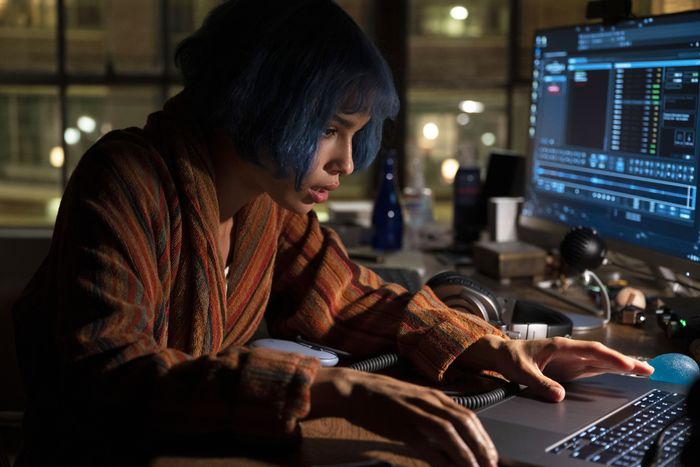
Angela (Zoë Kravitz), the heroine of Steven Soderbergh’s nimble new thriller, Kimi, lives alone in a roomy industrial loft in Seattle with steel casements that she leaves open to catch the breeze. In the mornings, she stands at one of those windows, drinking her coffee and exchanging flirty texts with a guy in the building across the street. Then she hops on her stationary bike, informing her virtual assistant — Kimi, an Alexa and Siri rival — to shut off the news and start a playlist called Oxytocin. When she’s ready to start the day, she puts on headphones, has Kimi open up yesterday’s screen, and settles into the presumably lucrative remote work she performs for Amygdala, the start-up behind Kimi that is slated to go public in two weeks. It’s the kind of life you can imagine seeing in a tech-company commercial with the beautiful, blue-haired, multiracial Angela as an aspirational avatar for a hip existence eased in every way by technology — so long as you ignore the obvious stress fractures. Angela doesn’t ever really leave that enviable apartment. Her routine, from the precise way she makes her bed to the meds she takes to the care with which she cleans the mouth guard she sleeps in, is all about warding off, or at least managing, the anxiety that rushes in whenever she reaches for the keys to go out the door.
Kimi — which is as crisp and effervescent as one of the high-end kombuchas Angela likes to drink, and which doesn’t linger on the palate much longer — was shot last spring, and rather than center or banish the pandemic from view, the film turns it into a backdrop, showing the ways it has worsened existing issues in Angela’s life while making it easier for her to disguise them. Agoraphobia is harder to spot when nobody’s going out, though Angela feels pressure to force herself back toward the normalcy everyone else is slowly returning to even though she isn’t ready. Something bad happened to her sometime before the world shut down, and she still hasn’t gotten back on her feet, but she tries, making plans to meet up with her across-the-way hookup, Terry (Byron Bowers), then crumbling to the ground in panic when she prepares to leave. It leaves her prickly and defensive, frustrated with her own trauma responses. And then, while listening to flagged Kimi recordings as part of her job to improve the device’s responses, she hears what sounds like a sexual assault buried under a wall of noise, something that sends her spiraling again but also makes her determined to report the supposedly anonymized incident to authority figures, who are indifferent or worse.
Kimi’s obvious inspirations include Rear Window (when it comes to the homebound Angela’s relationship to the wall of windows outside) and Blow Out (in its treatment of the audio evidence and the conspiratorial forces she stumbles onto). Its Hitchcockian aspirations are further signaled by the lush score from Cliff Martinez, which is deliberately out of step with the sleek, tech-centric setting. Like Soderbergh’s 2018 film Unsane, it’s a spare thriller that feels at once carefully crafted and made on the fly, its limitations serving as a source of inspiration: Unsane, which stars Claire Foy as a woman being kept against her will in a psychiatric hospital by unethical practices and the interventions of a stalker, was shot entirely on an iPhone, while Kimi was shot during the pandemic with some of its cast members — including Robin Givens as Angela’s mother and Andy Daly as Angela’s harried boss — showing up only on screens. Both films have a propulsive momentum that makes them extremely watchable even if, as is sometimes the case with these sketched-out works from Soderbergh, you can sense the filmmaker’s attention shifting to the next project before the credits on this one have rolled.
But Kimi threads its increasingly tense interactions with a modern melancholy. The other film it brings to mind isn’t a classic thriller but the 1995 movie The Net, in which Sandra Bullock plays an isolated systems analyst who socializes online and orders pizza off a website, behavior that’s entirely commonplace now but was presented at the time as the height of disconnection. Kimi doesn’t try to make outdated technophobic sensationalism new again, but it does explore how technology has allowed Angela to get by while allowing her to hide her wounds rather than try to heal. Terry, hoping to move their casual hookups into actual dating, brings up an image she posted on her Instagram, not realizing the account is full of photos she didn’t take herself. When Angela’s shrink pushes her to talk about difficult subjects, Angela eases her cursor across the Zoom window and exits mid-sentence to make it look like her internet cut out. Her surface-stable life teeters on the tenuous support system of the few people she can call on for help, something that becomes clear when she forces herself to venture out into the world to try to address the crime she stumbled on. One of the only people who truly sees her is another neighbor across the street (Devin Ratray), and that’s because he has plenty of time to look — like her, he doesn’t leave home.
More Movie Reviews
- The Accountant 2 Can Not Be Taken Seriously
- Another Simple Favor Is So Fun, Until It Gets So Dumb
- Errol Morris Has Been Sucked Into the Gaping Maw of True Crime


